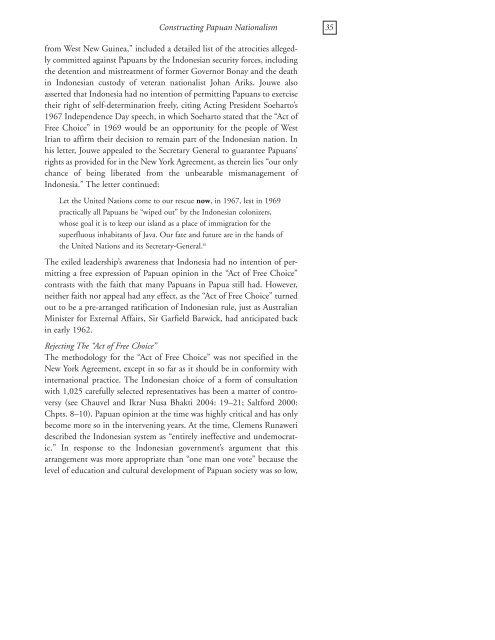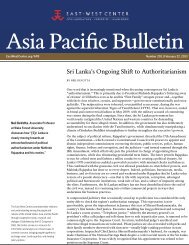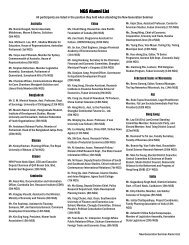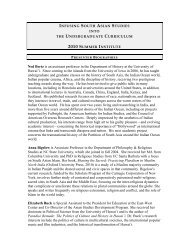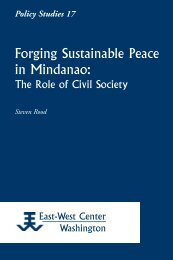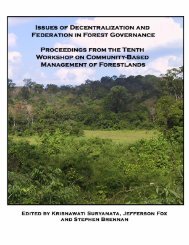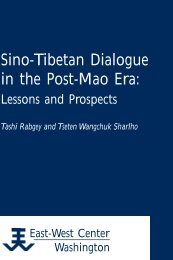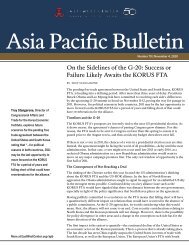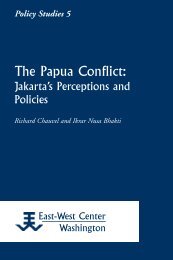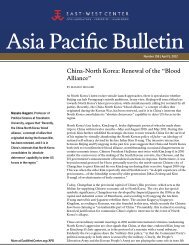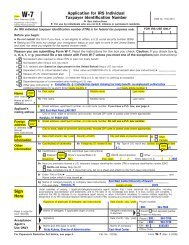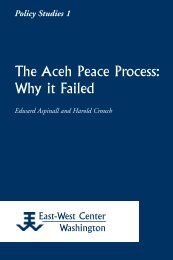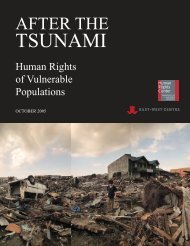Constructing Papuan Nationalism: History, Ethnicity ... - ScholarSpace
Constructing Papuan Nationalism: History, Ethnicity ... - ScholarSpace
Constructing Papuan Nationalism: History, Ethnicity ... - ScholarSpace
- No tags were found...
Create successful ePaper yourself
Turn your PDF publications into a flip-book with our unique Google optimized e-Paper software.
<strong>Constructing</strong> <strong>Papuan</strong> <strong>Nationalism</strong> 35from West New Guinea,” included a detailed list of the atrocities allegedlycommitted against <strong>Papuan</strong>s by the Indonesian security forces, includingthe detention and mistreatment of former Governor Bonay and the deathin Indonesian custody of veteran nationalist Johan Ariks. Jouwe alsoasserted that Indonesia had no intention of permitting <strong>Papuan</strong>s to exercisetheir right of self-determination freely, citing Acting President Soeharto’s1967 Independence Day speech, in which Soeharto stated that the “Act ofFree Choice” in 1969 would be an opportunity for the people of WestIrian to affirm their decision to remain part of the Indonesian nation. Inhis letter, Jouwe appealed to the Secretary General to guarantee <strong>Papuan</strong>s’rights as provided for in the New York Agreement, as therein lies “our onlychance of being liberated from the unbearable mismanagement ofIndonesia.” The letter continued:Let the United Nations come to our rescue now, in 1967, lest in 1969practically all <strong>Papuan</strong>s be “wiped out” by the Indonesian colonizers,whose goal it is to keep our island as a place of immigration for thesuperfluous inhabitants of Java. Our fate and future are in the hands ofthe United Nations and its Secretary-General. 61The exiled leadership’s awareness that Indonesia had no intention of permittinga free expression of <strong>Papuan</strong> opinion in the “Act of Free Choice”contrasts with the faith that many <strong>Papuan</strong>s in Papua still had. However,neither faith nor appeal had any effect, as the “Act of Free Choice” turnedout to be a pre-arranged ratification of Indonesian rule, just as AustralianMinister for External Affairs, Sir Garfield Barwick, had anticipated backin early 1962.Rejecting The “Act of Free Choice”The methodology for the “Act of Free Choice” was not specified in theNew York Agreement, except in so far as it should be in conformity withinternational practice. The Indonesian choice of a form of consultationwith 1,025 carefully selected representatives has been a matter of controversy(see Chauvel and Ikrar Nusa Bhakti 2004: 19–21; Saltford 2000:Chpts. 8–10). <strong>Papuan</strong> opinion at the time was highly critical and has onlybecome more so in the intervening years. At the time, Clemens Runaweridescribed the Indonesian system as “entirely ineffective and undemocratic.”In response to the Indonesian government’s argument that thisarrangement was more appropriate than “one man one vote” because thelevel of education and cultural development of <strong>Papuan</strong> society was so low,


